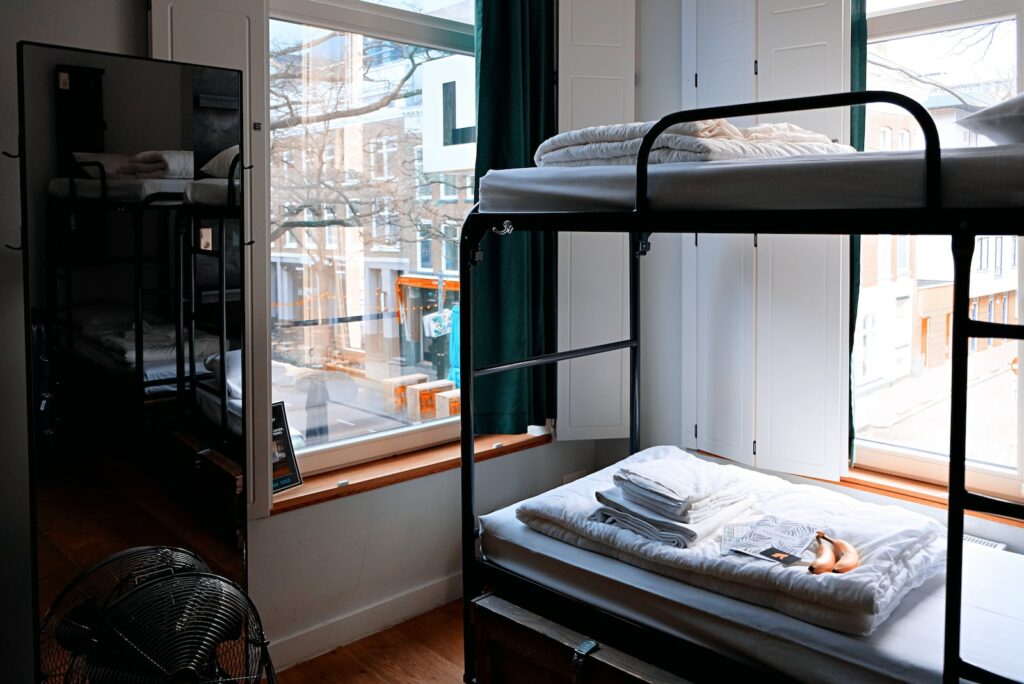Ah, the age-old debate for every college student, deciding on dorm life vs off-campus housing. Both choices come with their own set of pros and cons, and your decision will shape your college experience in many ways. But fear not! By the end of this article, you’ll have a clearer picture of which option might be the best fit for your unique needs.
Contents
- 1 Dorm Life: The Heart of Campus
- 2 Off-Campus Housing: Your Rules, Your Space
- 3 Financial Considerations
- 4 The Experience Factor
- 5 The Commute
- 6 Making The Decision
- 7 Conclusion: Dorm Life Vs Off-Campus Housing
- 8 FAQs
- 8.1 Is off-campus housing usually cheaper than dorm living?
- 8.2 Can I still participate in on-campus activities if I live off-campus?
- 8.3 Are there any safety concerns with off-campus housing?
- 8.4 Can I have pets in dorms or off-campus housing?
- 8.5 What if I don’t get along with my roommate in the dorms?
Dorm Life: The Heart of Campus
Embarking on your college journey and choosing to live in a dormitory, often referred to as a ‘residence hall,’ is akin to diving headfirst into a pool of collegiate spirit. This decision immerses you directly into the vibrant pulse of campus life. Here’s a more in-depth look into what makes dorm life the quintessential college experience for many:
Instant Community: Dive Into Collegiate Spirit
The beauty of dormitories is the immediate sense of belonging they foster. From the moment you set your luggage down, you’re plunged into a whirlwind of activity, from orientation games to late-night study sessions.
Living among peers, many of whom are also navigating this new chapter, means you’re never alone in your journey. These halls echo with laughter, debates, shared meals, and sometimes, shared challenges. The bonds formed in these corridors often last well beyond the college years, turning roommates into lifelong friends.
Proximity to Campus Facilities: Everything Within Arm’s Reach
Imagine this: you wake up to the alarm, stretch, and still make it to your morning lecture in just a tad over pajama time. Living in the dorm means the campus is your backyard. Need to pull an all-nighter for a project? The library is just a short walk away.
Feeling the urge for a midnight snack or a quick workout session between classes? The dining halls and campus gym are conveniently accessible. This proximity not only saves time but also encourages you to utilize these facilities to the fullest.
Safety and Structure: A Guided First Step
For many, college is the first taste of independence. And while the thrill of freedom is undeniable, it can also be slightly overwhelming. Dormitories offer a structured environment that eases this transition. Security measures, like keycard access and surveillance cameras, ensure students’ safety.
Additionally, the presence of RAs (Resident Assistants) is invaluable. These are senior students trained to assist, guide, and ensure a harmonious living environment. They organize events, mediate roommate disputes, and often serve as the go-to person for any dorm-related concerns. The set quiet hours also ensure that while fun is encouraged, academics never take a back seat.
Off-Campus Housing: Your Rules, Your Space
Stepping out of the college campus and choosing to live in off-campus housing can feel like a true leap into adulthood. It offers a tantalizing taste of freedom, but also serves as a crash course in responsibility.
Freedom and Flexibility: Crafting Your College Experience
Unlike the dormitory’s structured environment, off-campus housing comes with the allure of autonomy. Gone are the days of RAs overseeing your every move or curfews limiting your late-night adventures. Want to host a midnight movie marathon or adopt a pet? The choice is yours!
The freedom extends to your choice of living situation too. Dream of a chic studio apartment all to yourself? It’s possible. Prefer the company of friends or the experience of living with new roommates? You’re free to decide. This flexibility allows you to tailor your college living experience to your personal preferences.
Real-World Prep: Adulting 101
While dorm life shelters you from many adult responsibilities, off-campus housing thrusts them into your hands. Suddenly, rent deadlines loom, utility bills become a monthly concern, and ‘what’s for dinner?’ isn’t answered by a trip to the dining hall but by your own culinary skills (or sometimes, the friendly neighborhood takeout). While it might seem daunting, this is invaluable training for the post-college world. Navigating leases, budgeting for monthly expenses, and maintaining a household are critical life skills you’ll carry with you long after graduation.
Space and Privacy: A Sanctuary of Your Own
One of the undeniable perks of off-campus living is the upgrade in space. No longer confined to the sometimes claustrophobic quarters of a dorm room, you can enjoy spacious living areas, your own bedroom, and maybe even outdoor spaces like balconies or patios.
And with this space comes privacy – a luxury in the bustling environment of a college. Whether you’re an introvert needing regular solitude or just someone who cherishes their personal space, off-campus housing offers that haven.
Financial Considerations
Deciphering the financial maze of college housing options can be as tricky as solving a calculus problem on the first try. At a glance, dormitories might appear to be the wallet-friendly option, but a deep dive into the associated expenses can reveal a different story. Similarly, while off-campus housing might promise more independence, it also comes with its own set of fiscal responsibilities.
The Dormitory Deception
On the surface, dorm living often presents a neat package deal. Pay your fees, and you get a room, utilities, and sometimes even meals. However, these expenses can be deceiving. Universities often mandate meal plans for dorm residents, which, though convenient, can be costlier than independent grocery shopping and cooking. Add to this potential charges for amenities, parking, and laundry, and that initial price tag can balloon significantly.
The Off-Campus Equation
Living off-campus introduces you to the world of monthly rents and utility bills. Unlike the all-inclusive dorm fee, off-campus living often requires students to manage separate bills for electricity, water, internet, and sometimes even trash collection. Additionally, while you’re free from the confines of a university meal plan, you’re now tasked with budgeting for groceries, which can fluctuate based on your dietary preferences and cooking habits.
On the plus side, off-campus living allows for splitting costs with roommates, potentially leading to significant savings. And without the constraints of dorm policies, you might have the freedom to choose more budget-friendly service providers or utility plans.
Hidden Costs and Surprises
Both housing options come with potential unexpected costs. In a dorm, you might face fines for damages or policy violations. In an off-campus setting, maintenance issues, security deposits, and potential rent hikes can affect your budget.
The Experience Factor
College is often hailed as one of the most transformative periods in one’s life. It’s a time of discovery, growth, and, quite literally, experiencing the spectrum of human emotions and interactions. The place you choose to call home during these years plays a monumental role in shaping these experiences.
Life in the Fast Lane: The Dorm Experience
Dorms are essentially microcosms of college life. They’re vibrant, pulsating hubs where every door could lead to a new adventure. Late-night study sessions, impromptu hallway concerts, and debates that last till dawn – this is the dorm life in its full glory. There’s always someone to chat with, and there’s seldom a dull moment.
However, this energy can also have its drawbacks. With people always around, privacy becomes a luxury, and the relentless buzz might sometimes feel overwhelming. The drama, while occasionally entertaining, can also lead to unnecessary stress, especially when it’s coupled with the academic pressures of college.
Stepping into Adulthood: Off-Campus Living
Venturing off-campus feels akin to dipping your toes into the vast ocean of adulthood. The environment is notably calmer, allowing for pockets of solitude and introspection. Whether it’s sipping coffee on your balcony, hosting a dinner for close friends, or simply enjoying the silence of your room, off-campus living offers moments of peace that can be hard to find in the constant whirl of dorm life.
This setting often fosters a sense of responsibility, as you manage daily chores, bills, and even neighborly relations. However, while it promises tranquillity, it can also lead to feelings of isolation, especially if one doesn’t make an active effort to socialize and engage with the university community.
The Commute
Stepping out of the dorm and being minutes away from your next lecture is a luxury. Off-campus living often replaces this luxury with the daily reality of a commute. But like most things, commuting comes with its own set of advantages and challenges.
Time Management
When living off-campus, getting to class isn’t just about a quick walk across the quad. It requires planning. There’s the need to factor in travel time, unpredictable traffic jams, or public transport delays. It can teach you punctuality and help improve your time management skills, but it can also mean early mornings and potentially less sleep.
Daily Costs
A daily bus or train ticket, fuel for your car, or maintenance for your bike – these are all costs that can add up quickly. While off-campus rent might be cheaper, the costs associated with commuting can bridge that financial gap.
Flexibility and Freedom
Having a car or a bike offers flexibility. Want to head out for a late-night snack or explore the town over the weekend? You’re not reliant on limited campus transport or friends with cars. However, with this freedom comes the responsibility of vehicle maintenance or finding parking spaces, especially in areas close to bustling campuses.
Daily Dose of Real World
The commute can serve as a buffer between college life and the outside world. It’s a daily reminder of life beyond campus – a chance to interact with a diverse set of people on public transport, a moment to appreciate the city’s sunrise, or simply an opportunity to catch up on podcasts or reading.
Impact on Participation
One potential downside is the possible detachment from spontaneous campus activities. Late-night study groups, surprise events, or even just hanging out at the campus cafe might require a second thought when you’re watching the clock for your last bus home.
Making The Decision
Choosing between dorm life and off-campus housing is more than just deciding where to sleep; it’s about choosing the backdrop to your college narrative. Every student’s journey is unique, and where you reside can shape your experiences, relationships, and memories.
Self-Reflection
Start by understanding yourself. Are you an introvert who cherishes solitude, or an extrovert who thrives on social interactions? While dorms offer instant community access, off-campus housing might be the sanctuary an introvert craves after a day of lectures and group work.
Prioritizing Amenities
Think about the facilities you value most. Are on-site gyms, libraries, and dining halls crucial to your daily routine, or are you comfortable sourcing these amenities elsewhere? Off-campus housing might require more effort to access these facilities but offers a wider variety of local cafes, parks, and community centers.
Financial Implications
Take a hard look at your budget. While dormitories might include utilities in a bundled cost, off-campus living often requires juggling rent, utility bills, groceries, and commuting expenses. However, off-campus housing might allow for splitting costs with roommates or opting for more budget-friendly neighborhoods.
Commitment Levels
How long are you willing to commit? Some off-campus leases might require a year-long commitment, while dorm contracts often align with academic semesters, offering more flexibility for study abroad programs or internships.
Experience Versus Convenience
Dorms are a rite of passage for many, offering a unique experience that’s hard to replicate. They’re often a melting pot of cultures, backgrounds, and perspectives. Off-campus living, on the other hand, offers a taste of adulthood, from signing your lease to setting up your own Wi-Fi.
Future Considerations
Are you looking for a short-term solution, or are you considering staying on during the summer for internships or part-time jobs? Off-campus housing can offer stability without the need to move out during college breaks.
Conclusion: Dorm Life Vs Off-Campus Housing
Both dorm life and off-campus housing offer unique experiences. Whether you’re drawn to the heartbeat of on-campus life or the freedom of living off-campus, ensure your choice aligns with your personal, academic, and financial needs.
FAQs
Is off-campus housing usually cheaper than dorm living?
It depends on the city and specific housing situation. Always factor in additional costs like utilities, transportation, and groceries.
Can I still participate in on-campus activities if I live off-campus?
Absolutely! Being off-campus doesn’t exclude you from joining clubs, attending events, or utilizing campus facilities.
Are there any safety concerns with off-campus housing?
Just like any living situation, it’s essential to research the neighborhood, lock doors, and be aware of your surroundings.
Can I have pets in dorms or off-campus housing?
Most dorms don’t allow pets, with exceptions for fish or service animals. Off-campus housing policies vary, so check with your landlord.
What if I don’t get along with my roommate in the dorms?
Many colleges have processes for roommate mediation or room switches if conflicts arise.






